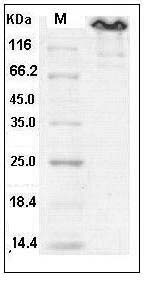-
Product Name
Human Contactin 3/CNTN3 (708 Asp/Asn, Fc Tag) recombinant protein
- Documents
-
Description
Contactins are a subgroup of molecules belonging to the immunoglobulin superfamily that are expressed exclusively in the nervous system. The subgroup consists of six members: Contactin-1, Contactin-2(TAG-1), Contactin-3(BIG-1), BIG-2, Contactin-5(NB-2) and NB-3. Since their identification in the late 1980s, Contactin-1 and Contactin-2 have been studied extensively. Axonal expression and the neurite extension activity of Contactin-1 and Contactin-2 attracted researchers to study the function of these molecules in axon guidance during development. Contactin-1 and Contactin-2 have come to be known as the principal molecules in the function and maintenance of myelinated neurons. In contrast, the function of the other four members of this subgroup remained unknown until recently. Contactin-3, also known as CNTN3 ( BIG-1 in rat and PANG in mouse ), is a GPI-linked glycoprotein that is expressed on cerebellar Purkinje cells, amygdaloid and thalamic neurons and olfactory granule cells. In the brain, Contactin-3 is expressed in frontal lobe, occipital lobe, cerebellum and amygdala. Contactin-3 contains 4 fibronectin type-III domains and 6 Ig-like C2-type (immunoglobulin-like) domains. Human Contactin-3 shares 92% aa identity with mouse Contactin-3.The exact function of Contactin-3 is unclear. Contactin-3 may mediate cell-cell interaction and may promote neurite outgrowth.
-
Protein name
Contactin-3
-
Protein short names
CONTACTIN 3; BIG-1; CNTN3; KIAA1496; PCS; PANG
-
Uniprot ID
Q9P232
-
Gene Name
CNTN3; KIAA1496; PANG
-
Source/Expression Host
Human Cells
-
Expression Plasmid/cDNA
A DNA sequence encoding the human CNTN3 precursor (NP_065923.1) (Met 1-Ser 1002, 708 Asp/Asn) was expressed with the fused Fc region of human IgG1 at the C-terminus.
-
Protein Species
Human
-
Molecular weight
The recombinant human CNTN3/Fc chimera consists of 1221 amino acids and has a calculated molecular mass of 134.5 kDa. In SDS-PAGE under reducing conditions, the apparent molecular mass of rhCNTN3/Fc chimera is approximately 160-170 kDa due to glycosylation.
-
Purity
> 90 % as determined by SDS-PAGE
-
Activity
Measured by the ability of the immobilized protein to support the adhesion of C6 Rat brain glial cells. When 5 x 10E4 cells/well are added to CNTN3 coated plates (0.8 μg/ml and 100 μl/well), approximately 30%-50% will adhere specifically after 60 minutes at 37℃.
-
Validations

Human Contactin 3 / CNTN3 Protein (708 Asp/Asn, Fc Tag) SDS-PAGE
Related Products / Services
Please note: All products are "FOR RESEARCH USE ONLY AND ARE NOT INTENDED FOR DIAGNOSTIC OR THERAPEUTIC USE"
